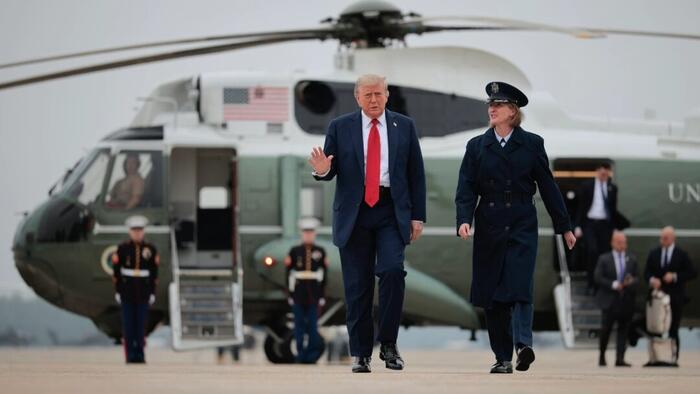


Authored by Emel Akan via The Epoch Times,
President Donald Trump arrived in Alberta, Canada, on Sunday for the Group of 7 (G7) summit, marking his first major international leaders’ gathering since beginning his second term in January.
Over the three-day summit, Trump will engage with the leaders of the world’s seven advanced economies to tackle pressing economic challenges and escalating geopolitical crises, particularly in the Middle East given the recent escalation to direct conflict.
Air Force One touched down at Calgary International Airport at 8:36 p.m. local time. Trump stepped off the plane donning an overcoat and a white “Make America Great Again” hat.
Alberta, a conservative, oil-rich province, is an intriguing choice for the summit, given an upcoming 2026 referendum on its potential separation from Canada.
The leaders’ summit, which marks the 50th anniversary of the G7, will be held in Kananaskis, nestled in the Canadian Rockies, from June 15 to June 17.
The group comprises the United States, Canada, France, Germany, Italy, Japan, the United Kingdom, and the European Union, representing more than half of global GDP.
This year’s gathering unfolds against the backdrop of active conflict between Israel and Iran, with both countries exchanging strikes for a third consecutive day as of June 15.
The latest conflict began on June 12 after Israel launched airstrikes targeting Iran’s nuclear facilities, senior officials, military leaders, and nuclear scientists.
The strikes came after the director general of the International Atomic Energy Agency (IAEA) said on June 9 that he was seriously concerned about Iran’s “rapid accumulation of highly enriched uranium.”
Israeli Prime Minister Benjamin Netanyahu said that in recent months, Iran had taken steps to “weaponize” and that “if not stopped, Iran could produce a nuclear weapon in a very short time.”
In response to the strikes, Iran launched missiles that breached Israel’s air defenses, striking residential areas, including in the capital of Tel Aviv. Israel has threatened a strong response.
Trump is calling on Tehran to agree to a new nuclear deal to avoid further devastation.
“Iran and Israel should make a deal, and will make a deal,” he wrote on Truth Social on Sunday.
“Many calls and meetings now taking place,” he added.
So far, neither side shows signs of de-escalation, with Israel issuing evacuation warnings to Iranian civilians near weapons facilities.
Prior to his departure for Canada, Trump responded to questions about tensions between Iran and Israel, voicing optimism for a deal.
“It’s time for a deal,” he said, adding, “Sometimes, they have to fight it out.”
When asked if he had called on Israel to halt airstrikes on Iran, Trump said he “wouldn’t say that.”
He also confirmed that the United States would continue to support Israel’s defense.
If the conflict continues, the Middle East crisis is likely to dominate discussions at the G7 summit.
Escalating trade tensions, driven by recent U.S. tariffs, will be another critical topic. Trump introduced new tariffs targeting all G7 nations, including host Canada, alongside specific duties on car imports and a steep increase in steel and aluminum tariffs to 50 percent.
Beyond trade, Trump has also intensified pressure on Canada and Mexico to address fentanyl trafficking. Mexican President Claudia Sheinbaum is also attending this year’s summit.
Canada has outlined three key priorities for this year’s summit.
The Russia-Ukraine war and the Gaza conflict will also feature prominently in discussions.
Ukrainian President Volodymyr Zelenskyy is expected to attend the summit and meet with Trump on the sidelines.
The president is scheduled to hold a bilateral meeting with Canadian Prime Minister Mark Carney on the morning of June 16. He is also expected to meet with Sheinbaum on the sidelines of the summit.
Additionally, China’s ruling Chinese Communist Party (CCP) will be a focal point, with leaders expected to voice concerns over the CCP’s escalation of tensions in the East and South China Seas, its military buildup, and the need for stability across the Taiwan Strait in the face of the CCP’s threats to bring the independently-governed island under its control.
The issue of critical minerals, essential for high-tech industries like electric vehicle batteries and semiconductors, is also important for the economic security of G7 nations, and the CCP’s dominance in this market is a growing concern for the United States and its allies.
There seems to be convergence on the topic of critical minerals, Navin Girishankar, president of the CSIS economic security and technology department, said during a press briefing.
The United States and the other G-7 partners are keen “to secure supply chains given China’s dominance, particularly around processing,” he said.
“So even if a floor is established with China on export controls on rare earths, the long-term interest of G-7 partners is to do more to identify and extract rocks in the ground, and process them increasingly domestically within G7 countries.”
